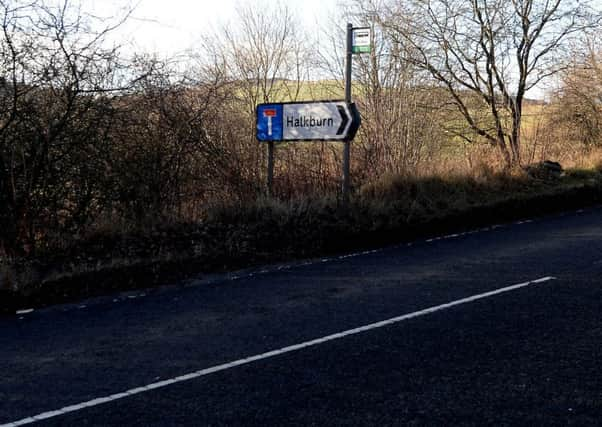Broadband report highlights need for speed in Borders


Residents of Halkburn Road are living in one of the slowest areas for internet speeds nationwide, according to research carried out by uSwitch.com between October 1, 2017 and September 30 last year.
The street features at No 17 on a list of slowest streets for broadband compiled by the price comparison sight after it carried out speed tests across 280,000 locations to find the fastest and slowest roads nationwide.
Advertisement
Hide AdAdvertisement
Hide AdThe average speed in the UK was found to be 46.2 megabits a second, yet Halkburn Road in Galashiels has an average download speed of just 0.466Mbps, meaning it would take residents there 30 hours to download a film on Netflix compared to an average of 18 minutes elsewhere.
And Halkburn is far from the only bit of the region to suffer from broadband woes, with almost one in five properties in the Borders unable to obtain speeds of over 30Mbps.
An OfCom report published in September showed that 17% of Borders properties had to put up with speeds of less than 30 megabits a second, more than twice the Scottish average of 8%.
Berwickshire, Roxburgh and Selkirk MP John Lamont said that the latest research laid bare the digital divide across the UK.
Advertisement
Hide AdAdvertisement
Hide Ad“We already know that the Scottish Borders has some of the slowest average broadband speeds in the UK, but this research really highlights the extent of the problem,” he said.
“For the Borders to feature in the worst 20 roads in the whole of the UK is both embarrassing and concerning.
“Broadband speeds like this are next to useless in this day and age and as residents in the Borders are often paying a premium, it is grossly unfair.”
He added that the universal service obligation due to come in to force over the next two years would give those with below-par service a legal right to request a decent broadband connection.
Advertisement
Hide AdAdvertisement
Hide Ad“This cannot come fast enough for residents and businesses in the Scottish Borders,” Mr Lamont said.
The OfCom report also showed that just 53% of rural Scotland can obtain 4G signal coverage from all mobile phone operators, compared to 99% of urban Scotland.
Urging the Scottish and UK governments to make sure the Borders does not get left behind, South of Scotland Labour list MSP Colin Smyth said the widespread lack of signal and slow broadband was holding businesses and the region’s economy back.
“It is no surprise to people living in Borders that we are behind Scotland’s big cities and towns in terms of broadband speeds and mobile signal,” Mr Smyth said.
Advertisement
Hide AdAdvertisement
Hide Ad“People in the Borders often go to use their mobile and find that they have no signal on their network.
“It is essential that the Scottish Government brings forward a detailed strategy on their much-talked-about R100 programme to ensure it is delivered in full and on time.
“The people of the Scottish Borders need to have clear expectations as previous digital schemes have only increased the digital inequality between rural and urban Scotland.
“Both the Scottish and UK governments must announce funding for the Borderlands growth deal that includes a number of initiatives to improve digital connections locally and provide a real boost for local communities, businesses and the economies.”
Advertisement
Hide AdAdvertisement
Hide AdMidlothian South, Tweeddale and Lauderdale MSP Christine Grahame is calling on the UK Government to better support Scotland’s digital ambitions, however.
Mrs Grahame, a substitute member of the Scottish Government’s rural economy and connectivity committee, said she was disappointed that the UK Government had only pledged a 3% funding contribution to R100, Holyrood’s scheme for superfast broadband to reach 100% of premises by 2021.
“Broadband access is in fact a matter reserved to the Tory UK Government,” she said. “Broadband is clearly vital to the Borders, and I’d ask John Lamont to join me in calling on the UK Government to increase their current funding contribution to R100 from its current level of just 3% of the total to better support the Borders.
“Mr Lamont ought to be pressing this with his Tory bosses at Westminster on behalf of homes and businesses in the Borders.
Advertisement
Hide AdAdvertisement
Hide Ad“It’s only because of the intervention of the Scottish Government that the percentage of premises connected to fibre broadband in the Borders is over 90% – without that, it would be just over 30%.”
A spokesperson for Scottish Borders Council, which invested an additional £8.4m in the digital Scotland superfast broadband programme, said: “Whilst that investment has helped contribute to the 93.7% coverage achieved to date, it is unfortunately the case that many households and businesses in rural areas of the Borders are still unable to access genuine superfast broadband.
“The council continues to press the relevant organisations and governments to ensure that these premises receive this vital service as quickly as possible.”